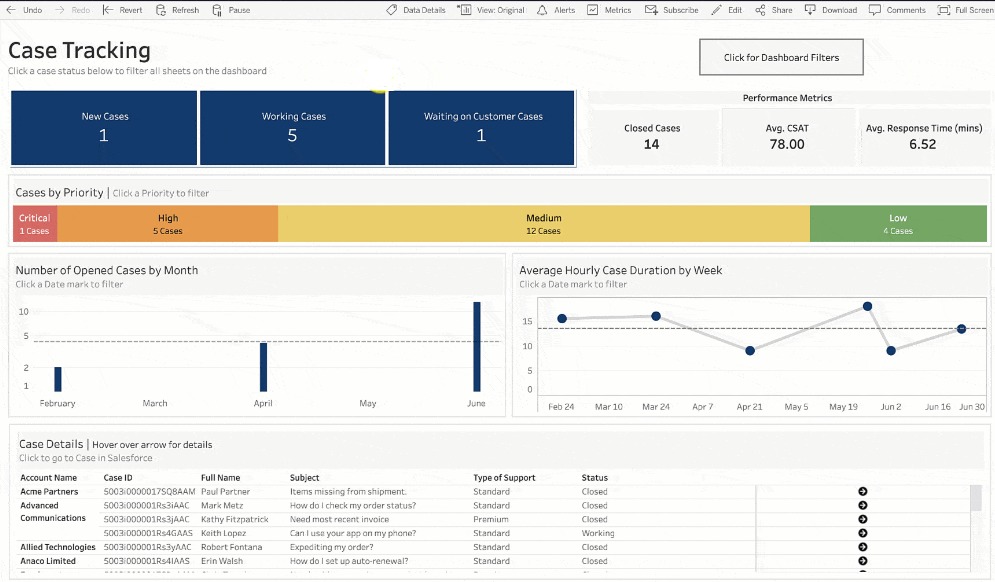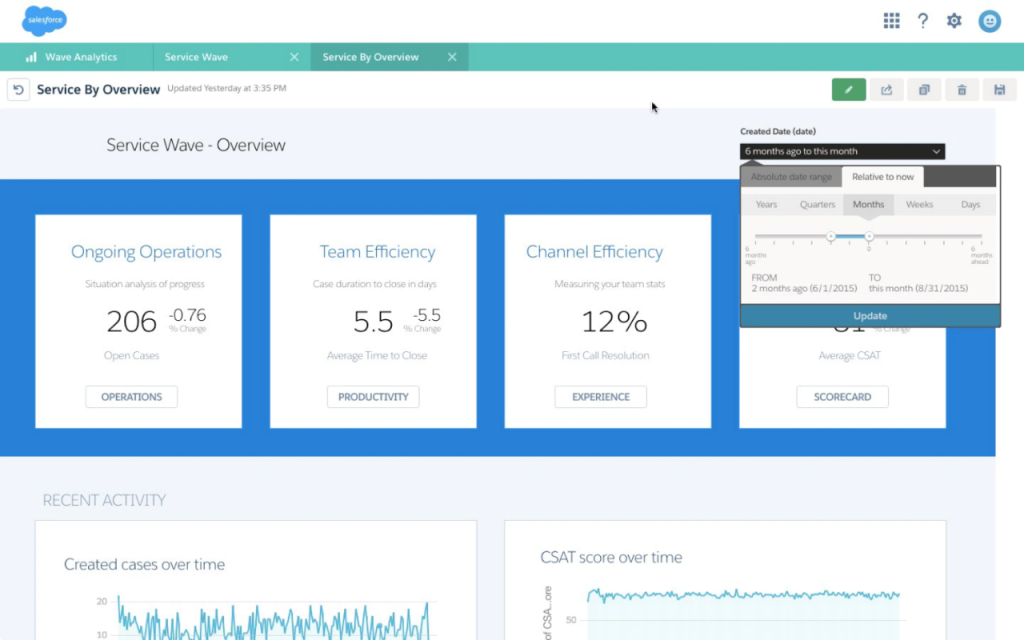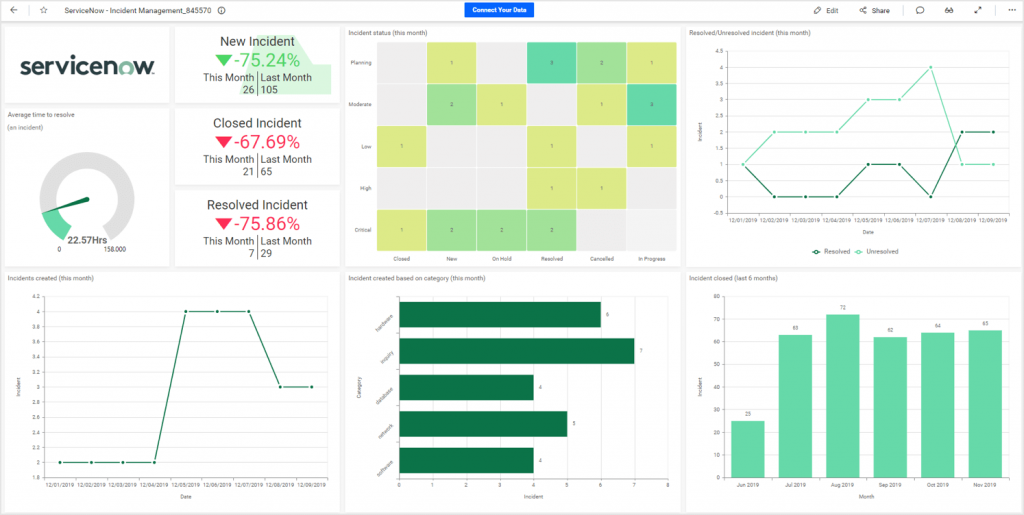If you are managing a brick-and-mortar store or an ecommerce business, then you know how demanding the new generation of consumers are. Thanks to the development of various communication channels, there are now more ways for customers to reach out to their favorite brands. This makes customer support a key requirement for businesses that want to build a better relationship with their customers and potentially turn clients into repeat buyers.
One way that you can meet the growing needs of your customers is by adopting customer support software that can help you optimize key processes for your customer support team. But with so many software products available in the market today, choosing one to invest in needs to be done carefully.
To help you narrow down your choices, we discuss in this article two of the leading customer support software products today. Salesforce Service Cloud and ServiceNow are two of the highest-rated solutions in the customer support solutions category. In this article, we compare Salesforce Service Cloud vs ServiceNow and highlight each platform’s main features and functionalities and provide you with an in-depth comparison of their core capabilities.

Service Cloud and ServiceNow Comparison Table of Contents
Every business wants to be at the forefront of customer service. After all, customer experience is the key differentiator between you and your competitors, and providing excellent support to your prospects and clients can go a long way in driving more sales and increasing profits for your business.
Regardless of the kind of business that you are running, providing great customer support can help you maintain customer loyalty, grow revenue, and improve your overall business strategy. Even better, outstanding customer service can be the secret to making a name for your brand in your industry.
And these are not merely claims—in fact, findings from the most recent reports and customer support statistics emphasize the value of customer service for most businesses. According to a Salesforce research, 89% of customers are more likely to become repeat buyers after a positive customer experience. Meanwhile, 78% are still willing to buy again from brands that made a mistake but resolved the issue in a satisfactory manner.
Customers Who Are Likely to Become Repeat Buyers
With that in mind, we present to you Salesforce Service Cloud and ServiceNow, two of the most well-known and top-rated customer support solutions that can ease your processes and help your customer support team improve and grow their impact. In the following sections, we discuss in detail what each platform has to offer you and how they can benefit your business.
Overview of Salesforce Service Cloud and ServiceNow
Salesforce Service Cloud is an industry-leading customer support platform that enables businesses to deliver faster and reliable case resolutions. Complete with features for case management, incident management, knowledge management, omnichannel routing, and more, the platform helps you resolve issues across any channel and increase customer satisfaction for your business.
The platform is highly customizable, which means you can easily personalize your workflows to reflect your customer support and business processes. In this way, you can streamline your service processes and drive productivity for your customer service team. In addition, Salesforce Service Cloud provides your agents with a holistic and 360-degree view of every customer, giving them all the activity, answers, and information they need to resolve issues more quickly.
Powered by AI, the platform also allows you to automate business processes with intelligent workflows. It comes with no-code and low-code builders that help you develop, manage, and run automated processes that follow the specific requirements of your business. Moreover, Salesforce Service Cloud lets you simplify complex business processes across the different departments in your organization.
ServiceNow

ServiceNow is another powerful customer support platform that helps businesses address customer needs quickly and proactively. It provides all the essential tools you need to resolve any customer issue with your products or services. The platform lets you manage multiple support channels to help you deliver exceptional customer service at any given time.
In addition, ServiceNow lets you bring together your front, middle, and back-office processes. In this way, you can easily connect your customer service to other departments in your organization and automate workflows for faster resolution of customer issues. The platform also offers a customer central portal that provides your agents with a consolidated view of customer data, which helps drive the productivity of your team.
ServiceNow provides workforce optimization features that ensure the efficiency of your workflows and maximize the skills and potential of your agents. For instance, you can optimize schedules, manage shifts, and improve service quality through performance tracking and intelligent skill development recommendations. Furthermore, ServiceNow lets you analyze voice recordings, monitor conversations, and track capacity utilization across all your customer support channels.
Detailed ServiceNow Knowledge Management Review
Salesforce Service Cloud vs. ServiceNow Comparison
Salesforce Service Cloud and ServiceNow are two of the most well-known and trusted software products in the customer support software category. Both platforms offer distinct characteristics and capabilities that make them desirable and optimal choices for many businesses.
To make it easier for you to choose between Salesforce Service Cloud and ServiceNow, we provide in the following sections an in-depth comparison of each software’s core features, integrations, pricing, ease of use, and more.
Core Features
Salesforce Service Cloud and ServiceNow both provide a plethora of customer support tools, but to say that both are on the same level of operational efficiency is an overstatement. To compare the two platforms, we discuss below each specific feature they offer and see which one can offer more value for your money.
Unified Inbox
One of the most important features of a customer support platform is a unified inbox, which brings together all the customer messages that you receive in one central console. Since there are now plenty of channels where customers can reach you, one useful tip for customer support is to have a single, unified platform that gives you a consolidated view of all the messages you receive from your customers.
Salesforce Service Cloud and ServiceNow tackle this feature quite differently. Salesforce Service Cloud offers a central service console, which makes it easier for your agents to follow your business practices and help customers through multiple channels, whether via phone, email, web forms, or messaging apps. Through this service console, agents can easily navigate through multiple customer records and access tools that can help them resolve each customer case more quickly.
On the other hand, ServiceNow comes with a unified agent inbox that lets you manage all your incoming work items, such as cases, chats, and incidents. From here, you can monitor all conversations, chat requests, and case assignments and then use designated service channels to route work items to available agents. The agent inbox also displays the queues assigned to every agent, as well as the number of active chats in each queue and the average wait times.
Ticket Management

Salesforce Service Cloud allows you to monitor cases and resolve issues faster.
When you have multiple support requests coming in, it can be challenging to process them all at once—some requests can fall through the cracks, customers with complicated issues may bounce from one agent to another, and problems may not get resolved to the satisfaction of your customers.
Ticket management plays an important role in the customer support of any business. With a robust service ticket system, you can easily capture every customer service request, manage it appropriately, assign it to the right agent, and resolve the issue on time.
Salesforce Service Cloud and ServiceNow both offer powerful ticket management features, each specifically designed to help you deliver smarter, faster, and more personalized customer support. In Salesforce Service Cloud, you can customize and configure the features and functionalities of your ticketing system to fit the specific needs of your business.
For every ticket created in Salesforce Service Cloud, you can track all calls, emails, messages, and other important customer data related to the case. The platform’s AI-powered routing also allows you to intelligently assign cases to the agents with the right skills and knowledge to resolve each ticket.
Meanwhile, ServiceNow’s ticketing system utilizes a unique delivery model that enables businesses to manage and resolve customer issues more proactively. The solution allows you to differentiate ticket types, prioritize them accordingly, and allocate required resources for the resolution of each case as needed. Also, ServiceNow lets you automate a number of repetitive and arduous tasks, such as approvals, notifications, tasks, and record operations.
Self-Service Portal
Self-service portals help customers find answers fast without any need for intervention by your customer support agents. This can drastically reduce agent case volume and increase customer satisfaction for your brand. By offering self-service portals, you can spend less time answering customers’ questions and more on productive and income-generating activities.
Through knowledge base articles, customer forums, and self-help resources, you can provide your customers with all relevant and up-to-date information about your products or services. These self-service portals can include FAQs, guides to getting started, and troubleshooting articles. Integrating a search bar on top of your site makes it easier for your customers to find the topics or discussions that they want to see.
In Salesforce Service Cloud, you can easily launch branded and personalized portals using the platform’s low-code community builder. This tool has a drag-and-drop functionality that lets you build mobile-responsive portals and self-service help centers. From here, you can embed knowledge articles and how-to guides and give customers access so they can resolve issues on their own.
Furthermore, Salesforce Service Cloud lets you create a self-service community where customers can find information, manage their accounts, and interact with your agents, in-house experts, and other customers having the same issues. By enabling public access to your community portal, customers can effortlessly discover the topics they are looking for through Google and other search engines.
Similarly, ServiceNow offers a single self-service portal where users can access services, information, and applications. The platform provides an array of user-friendly tools to help you create engaging and intuitive self-service experiences for your customers. ServiceNow utilizes artificial intelligence to help users find answers and solve problems more quickly.
Communication System
Communication, both internal and external, is the backbone of customer support for any kind of business. Corporate and internal communication go hand-in-hand delivering messages to different audiences. Whether it’s for agent-to-agent or agent-to-customer communication, it’s important to consider how a customer support platform can help you streamline interactions within your organization.
Salesforce Service Cloud and ServiceNow both have a wide range of communication tools to facilitate collaboration among your team and communication with your customers. But in the case of Salesforce Service Cloud vs ServiceNow, there are obvious differences between the two platforms when it comes to handling internal communications and delivering customer-facing communication options.
Internal Communication System
Salesforce Service Cloud offers an omnichannel workspace that gives a 360-degree view of your organization, including your tasks and the performance of your agents. By integrating data from HR systems, you can centralize employee profiles and access apps and content from a tailored workspace. Through the Salesforce Service Cloud Platform, you can also connect with your employees via chat, email, messaging apps, and more.
Likewise, ServiceNow supports traditional channels like telephony integrations, messaging platforms like WhatsApp and Facebook messenger, SMS, emails, and chats. With its agent workspace, your team gets instantly notified of customer support requests, enabling you to mitigate major incidents as early as possible.
Customer-Facing Communication Options
Salesforce Service Cloud supports customer interactions on every channel, whether on social media, email, live chat, messenger apps, and more. The platform comes with a messaging tool that lets you deliver personalized support to your customers via their preferred messaging apps, like SMS, Facebook Messenger, and WhatsApp.
Furthermore, you can make use of Salesforce Service Cloud’s chatbots and integrate them with SMS and WhatsApp chats to send automated responses to your customers. Through the platform’s omnichannel routing, you can automatically route tickets and cases to the right agent based on their knowledge, skillset, and availability.
Likewise, ServiceNow allows you to support your customers through phone, chat, email, social media, and messaging apps. It also has omnichannel capabilities that help you provide customer support through various communication channels at any given time. In addition, integrations with messaging apps allow you to engage in conversations that span cases and topics about your products and services.
Customer Service Management

At a glance, Salesforce Service Cloud gives you an overview of your team’s tasks and performances.
When it comes to customer service management, Salesforce Service Cloud outperforms ServiceNow in many aspects, from the personalization of workflows, skills development of agents, and tracking performance to managing client complaints and compliments. The platform also helps you improve customer satisfaction with immediate agent assistance and faster case resolutions.
Another distinctive feature of Salesforce Service Cloud is its set of customer service scripts, which enable agents to streamline communication with your customers, capture all relevant information, and reduce errors for inbound and outbound calls. The platform gives you a real-time view of customer activities to ensure that you can provide the right kind of support that your customers need.
Furthermore, Salesforce Service Cloud improves the efficiency and productivity of your team by automating workflows. Through its no-code and low-code builders, you can simplify complex processes, such as task assignments, automated responses, and agent routing.
On the hand, ServiceNow’s customer service management features enable you to optimize your customer support operations by bringing together siloed systems and removing bottlenecks from your processes. The solution makes this possible by providing you with a visual representation of your process flows so you can take immediate actions as necessary. AI-powered tools also allow you to identify key trends and unwanted behaviors from your workflows, enabling you to maximize the potential of your customer support teams.
Reporting and Analytics

ServiceNow provides you with a complete view of your customer support operations.
Salesforce Service Cloud and ServiceNow both have a wide range of reporting and analytics capabilities. Each platform offers unique functionalities to help you track agent performance, identify gaps in skill sets, and define improvements and new opportunities for your business.
In Salesforce Service Cloud, you can stay ahead of business concerns by having all important KPIs and metrics in one screen. The solution lets you track customer satisfaction, customer effort, and employee satisfaction scores, as well as the total wait times and the number of customers submitting support tickets. Plus, the platform’s analytics tool gives you key insights from customer profiles and case histories.
Furthermore, Salesforce Service Cloud comes with an omni-supervisor tool that allows you to monitor agent performance and keep track of their voice transcripts and chats as they help your customers. Prebuilt datasets and dashboards within the platform also help you assess team performance and contact center scheduling.
Meanwhile, ServiceNow’s reporting and analytics tool provides valuable data for analyzing, monitoring values, and viewing progress. The platform also allows you to make use of data visualizations like charts and graphs so you can easily convey and picture complex data, reports, and insights in more consumable ways.
Additionally, ServiceNow helps you gain real-time visibility across multiple channels to ensure that your contact center operations are running at peak performance. It gives you a holistic view of all the KPIs that you need to track to monitor your team’s performance and progress.
Salesforce Service Cloud vs ServiceNow Core Features Key Takeaways:
- Salesforce Service Cloud and ServiceNow both offer the essential features to help you improve the productivity of your team and maximize the efficiency of your customer support and contact centers.
- Salesforce Service Cloud’s main strengths lie in its customer service management feature, which helps businesses deliver excellent support to their customers through various communication channels.
- ServiceNow’s case management, agent workforce, and self-service portals allow businesses to optimize their contact center operations.
Integrations
Integration with third-party apps ensures a smooth flow of information among all your tech stacks, allowing you to use all your business applications in unison. This helps you coordinate and automate business processes so that you can improve productivity and efficiency across your entire organization.
Salesforce Service Cloud and ServiceNow both offer flexible integration options to help you maximize your digital workflows and create seamless user experiences. With Salesforce Service Cloud, you can integrate back-office applications and most-used phone systems, enabling you to extend the capabilities of your contact center operations. Popular integrations include Amazon Connect CTI, 8×8 Virtual Office, and Talkdesk for Salesforce.
As for ServiceNow, a variety of techniques for integrations can be used, including APIs, command-line integrations, REST, and other industry-standard technologies. ServiceNow’s app store also offers plenty of app integrations, making it easier for you to connect with the systems that you are already using.
Salesforce Service Cloud vs ServiceNow Integrations Key Takeaways:
- Salesforce Service Cloud and ServiceNow allow integrations with third-party apps and systems that you are already using in your business processes.
- Salesforce Service Cloud supports back-office applications and out-of-the-box integrations.
- ServiceNow offers a wide range of integrations within its app store and through APIs, REST, command-line integrations, and more.
Pricing
Pricing is an important factor to consider in choosing which software product to buy. Ideally, you want to purchase a solution that offers a wide range of capabilities at a good price—in some cases, you’ll find a good bargain with platforms that have affordable pricing tiers, but there are also some top-notch product options that justify their value for a price.
Salesforce Service Cloud and ServiceNow both offer multiple pricing tiers based on the number of users and the essential features that you need for your business processes. For each product package, more functionalities are added as the pricing tier goes up.
Starting price for Salesforce Service Cloud is $25/user/month. This is its Essentials plan, which includes basic features like case auto-assignment, case escalation rules, omnichannel routing, computer telephony integration, and customizable reports and dashboards. The solution also offers a Professional plan for $75/user/month, Enterprise plan at $150/user/month, and Unlimited plan at $300/user/month.
ServiceNow, on the other hand, requires a custom quote from the vendor before product purchase. Nonetheless, the product package for ServiceNow includes scalable customer service management features, as well as other tools tailored to the unique needs of your enterprise.
Salesforce Service Cloud vs ServiceNow Pricing Key Takeaways:
- Salesforce Service Cloud and ServiceNow offer various pricing depending on the number of users and the functionalities that you need for your contact center operations.
- Salesforce Service Cloud’s pricing plans range from $25/user/month to $300/user/month.
- ServiceNow’s pricing plans are available by quote.
Ease of Use
Finding a software product with user-friendly features and functionalities can dramatically improve the adoption and productivity rates of your company. A software’s ease of use can make your team’s day-to-day workflows much simpler and hassle-free. Also, good usability of a software product reduces the need for admin and IT support.
Between Salesforce Service Cloud vs ServiceNow, the former clearly wins in the ease of use category, especially with its easily navigable customer data and contact center dashboards. The platform also gives you better visibility into your customer records, agent performance, opportunities, and ongoing tasks all from a single place. In turn, you can easily collaborate with your team and provide support and resolutions to your customers much more quickly.
On the other hand, ServiceNow can be quite intimidating at first use, and users might need orientation on navigating through the tools offered by the platform. However, functionalities are easy to learn, so once you get a good grasp of using the software, you and your agents can effortlessly manage workflows, support requests, tasks, incidents, and other customer support-related functions.
Salesforce Service Cloud vs ServiceNow Ease of Use Key Takeaways:
- Salesforce Service Cloud and ServiceNow offer different levels of ease of use for the user.
- Salesforce Service Cloud is the most optimal choice for you if you are looking for a user-friendly customer support platform.
- In comparison to the former product, ServiceNow’s features and functionalities may take time to get used to.
Getting Started
Whether you’re just starting to set up customer support for your business or have been providing this service for a little while now, Salesforce Service Cloud offers a fast and easy implementation process, allowing you to get used to the software’s features and functionalities in no time. The platform is also highly customizable, which means you can personalize workflows and configure the solution according to the needs of your business.
As a cloud solution, Salesforce Service Cloud takes much less time implementing compared to other standard solutions. In just a few clicks, the platform lets you jump-start your customer support operations with its user-friendly interface, making it easier for your team to navigate through the tools that you need right from the start.
Meanwhile, ServiceNow provides a smarter way to manage your customer support processes, from the adoption of the software itself to delivering the right support that your customers need through various channels. The solution also comes with a full stack of no-code and pro-code developer tools, allowing you to build your own workflows from scratch and automate your business processes.
Salesforce Service Cloud vs ServiceNow Setup Key Takeaways:
- Both Salesforce Service Cloud and ServiceNow have customization and developer tools that make them easier to implement and adopt.
- Salesforce Service Cloud offers a seamless user experience by allowing you to customize the system according to your business requirements.
- You can use ServiceNow’s no-code or pro-builder apps to customize your system and extend its capabilities for customer support.
Use Cases

ServiceNow offers incident management tools to help you fix issues in a timely manner.
As a customer support tool, Salesforce Service Cloud provides businesses from any type of industry with plenty of features to help deliver personalized support and services to clients. It has built-in productivity tools, an omnichannel console, and automation that allows you to provide support and resolve customer cases faster.
Specifically, several companies across various industries use Salesforce Service Cloud to:
- Provide crucial information or key knowledge articles to customers.
- Automate service processes for efficient support.
- Provide means to identify topics and experts to assist customer support agents.
The platform also serves as an incident management tool that allows your team to identify, monitor, and resolve issues with proven workflows. It provides a single, unified workspace that gives you complete visibility of all cases, incidents, and customer data, enabling you to proactively address problems ahead of time.
Meanwhile, ServiceNow enables you to simplify complex customer service processes and unify siloed teams and systems with its robust set of customer service management tools. It helps you digitize multi-step processes, such as requesting and receiving information from customers, as well as initiating workflows and creating tasks. It also equips your team with an agent assist tool that performs automatic searches to help agents resolve customer issues.
Accordingly, industries and organizations use the application to provide key information on:
- session notes and recordings
- representative involved
- file transfer information
- customers involved
- teams involved
- chat transcript
Salesforce Service Cloud vs ServiceNow Use Cases Key Takeaways:
- Salesforce Service Cloud and ServiceNow offer a wide array of tools that can optimize your customer support processes and improve customer service, case management, and incident management.
- Salesforce Service Cloud’s customer support and built-in productivity tools enable businesses to deliver the right kind of support and assistance to their clients.
- ServiceNow enables businesses to improve the efficiency of their contact center operations by automating and digitizing processes.
Salesforce Service Cloud vs. ServiceNow Comparison Table
|
Salesforce Service Cloud |
ServiceNow |
|
| Ideal for |
|
|
| Use cases |
|
|
|
Core Features |
||
|
Unified Inbox |
✓ |
✓ |
| Ticket Management |
✓ |
✓ |
|
Self-Service Portal |
✓ |
✓ |
| Communication System |
✓ |
✓ |
|
Internal Communication |
✓ |
✓ |
| Customer-Facing Communication Options |
✓ |
✓ |
| Customer Management |
✓ |
✓ |
| Reporting and Analytics |
✓ |
✓ |
|
Key Integrations |
||
| Slack |
✓ |
✓ |
| Zoho CRM |
✓ |
✓ |
| Wrike |
✓ |
|
| Oracle Service Cloud |
✓ |
✓ |
| AutomatePro |
|
✓ |
|
Pricing |
||
| Starts from | $25/user/month | By quote |
| No. of plans |
4 |
Tailored plan |
Salesforce Service Cloud and ServiceNow—Which is Better?
Salesforce Service Cloud and ServiceNow are both at the top of their game in the customer support software category. Each platform offers a distinctive set of customer service management features and functionalities that can help your business address customer problems in a timely and satisfactory manner. Whichever one you choose, you are guaranteed a powerful solution that would allow you to deliver high-quality and efficient customer service
But if it’s between Salesforce vs ServiceNow, which is better between the two? In most factors discussed above, however, it becomes clear that Salesforce Service Cloud sets the bar higher in customer service and case management. Jam-packed with customer support and productivity tools, Salesforce Service Cloud equips your team with everything they need to handle cases professionally while providing the best customer experience to your clients.
Before jumping the gun on buying customer support software, you may want to do a test drive first to see what these two platforms have to offer. Salesforce Service Cloud offers a free trial of the platform, whereas ServiceNow provides a demo where you can see for yourself the core features and functions that the product offers. For other product selections, you may also want to check our guide for customer support tools.
Key Insights
- Feature Comparison:
- Salesforce Service Cloud: Known for its robust customer service management features, omnichannel routing, customizable workflows, and AI-powered automation. It excels in providing a unified inbox, ticket management, self-service portals, and extensive communication options.
- ServiceNow: Offers comprehensive customer support tools, including unified agent inbox, workforce optimization, and incident management. It integrates well with various systems and provides strong reporting and analytics capabilities.
- Integration Capabilities:
- Both platforms support integration with third-party apps and systems. Salesforce Service Cloud integrates back-office applications and phone systems, while ServiceNow offers extensive integration options through APIs and its app store.
- Pricing and Ease of Use:
- Salesforce Service Cloud: Offers multiple pricing tiers starting from $25/user/month to $300/user/month, with a reputation for being user-friendly and easy to implement.
- ServiceNow: Requires a custom quote for pricing, and while initially more complex, it offers extensive features once users are familiar with the system.
- Target Users:
- Both platforms cater to small, medium, and large enterprises, offering scalable solutions for various business sizes.
- Customer Service Management:
- Salesforce Service Cloud: Excels in personalization of workflows, automation, and providing a real-time view of customer activities.
- ServiceNow: Focuses on optimizing customer support operations by unifying systems and identifying key trends through AI-powered tools.
FAQ
- What are the primary features of Salesforce Service Cloud? Salesforce Service Cloud offers case management, incident management, knowledge management, omnichannel routing, customizable workflows, AI-powered automation, and a unified inbox. It also provides extensive communication tools, including chatbots, messaging integration, and an omnichannel console.
- How does ServiceNow handle customer support? ServiceNow provides a unified agent inbox, workforce optimization, and incident management tools. It integrates various communication channels and offers AI-driven analytics and reporting to streamline customer support processes and enhance efficiency.
- Which platform offers better integration options? Both Salesforce Service Cloud and ServiceNow offer robust integration capabilities. Salesforce integrates well with back-office applications and phone systems, while ServiceNow supports integrations through APIs, command-line tools, REST, and an extensive app store.
- What is the cost difference between Salesforce Service Cloud and ServiceNow? Salesforce Service Cloud offers tiered pricing starting from $25/user/month to $300/user/month. ServiceNow requires a custom quote based on the specific needs and scale of the business.
- Which platform is easier to use for beginners? Salesforce Service Cloud is generally considered more user-friendly and easier to implement, making it a better choice for beginners. ServiceNow, while initially more complex, offers extensive functionalities once users become familiar with the system.
- Can both platforms be customized to fit specific business needs? Yes, both Salesforce Service Cloud and ServiceNow offer customization options. Salesforce provides no-code and low-code builders for creating custom workflows, while ServiceNow offers no-code and pro-code developer tools to build and automate business processes.
- Which platform is better for small businesses? Salesforce Service Cloud, with its user-friendly interface and tiered pricing, is often more suitable for small businesses. However, both platforms can cater to small businesses depending on specific needs and budget.



























Leave a comment!